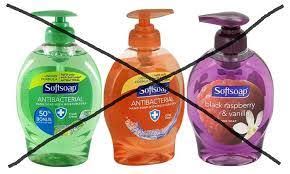
It seemed like a good idea at the time. If you have a cleaning solution, why not add antibacterial agents, such as triclosan, to make it more effective at killing germs? It was a really effective marketing tool. Sales increased, and the use of bacteria-fighting chemicals became so ubiquitous that it was hard to find a cleaning solution without them.
Flash forward to the present and the word « triclosan » has become foul. In response to the FDA’s request for more information about their long-term health effects, companies have begun removing triclosan and other anti-bacterial agents from their popular cleaning formulas. This says a lot. In order to keep their popular anti-bacterial soaps and cleaners on store shelves, manufacturers were required to prove their safety, and/or show that they worked better than regular soap and water for preventing the spread of viral or bacterial infections. Obviously, they failed.
If you look over the recent studies about triclosan, you wouldn’t be surprised. Not only have they been shown to damage the microbiome of your gut, but they may also effect the way your hormones work, negatively affecting thyroid functioning. In addition, triclosan has now been found to impair muscle function. In research done on mice, the addition of a single dose of triclosan reduced heart muscle function as much as 25%, acting very much like a cardiac depressant. Grip strength was also reduced by as much as 18%.
Since there is no proof that antibacterial chemicals reduce infection any better than simple soap and water, and since these products are also be contributing to the growing problem of antibiotic resistance, why use them? Often, the best course of action is also the simplest one. Find products with the simplest, most natural ingredients available, and avoid unnecessary chemicals whenever possible. When something flashy comes along that claims it will make our lives safer or easier, we’d be wise to ignore it and remember this rule.
About the Author: Rebecca Wong has a BA in English Literature from the University of Waterloo and has been working in the herbal business since 2000. She studied at the Ontario College of Traditional Chinese Medicine under respected authorities Paul Des Rosiers and Vu Le, and graduated from the East West School of Planetary Herbology under Michael Tierra. She received training as a yoga teacher at The Branches in Kitchener/Waterloo, and therapeutic yoga teacher training from the School for Somatic Soulwork under Deniz Aydoslu. She now teaches yoga for anxiety, depression and burnout at Rebecca's Restful Yoga Studio in Toronto.